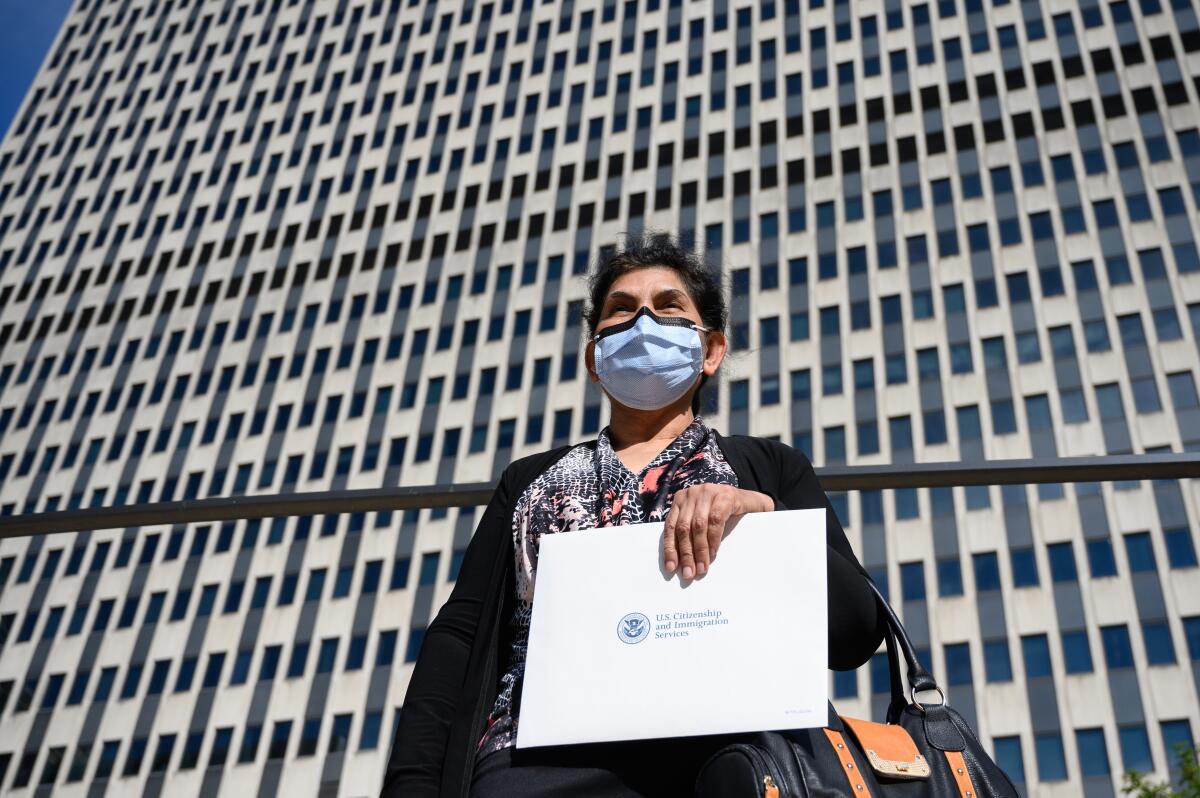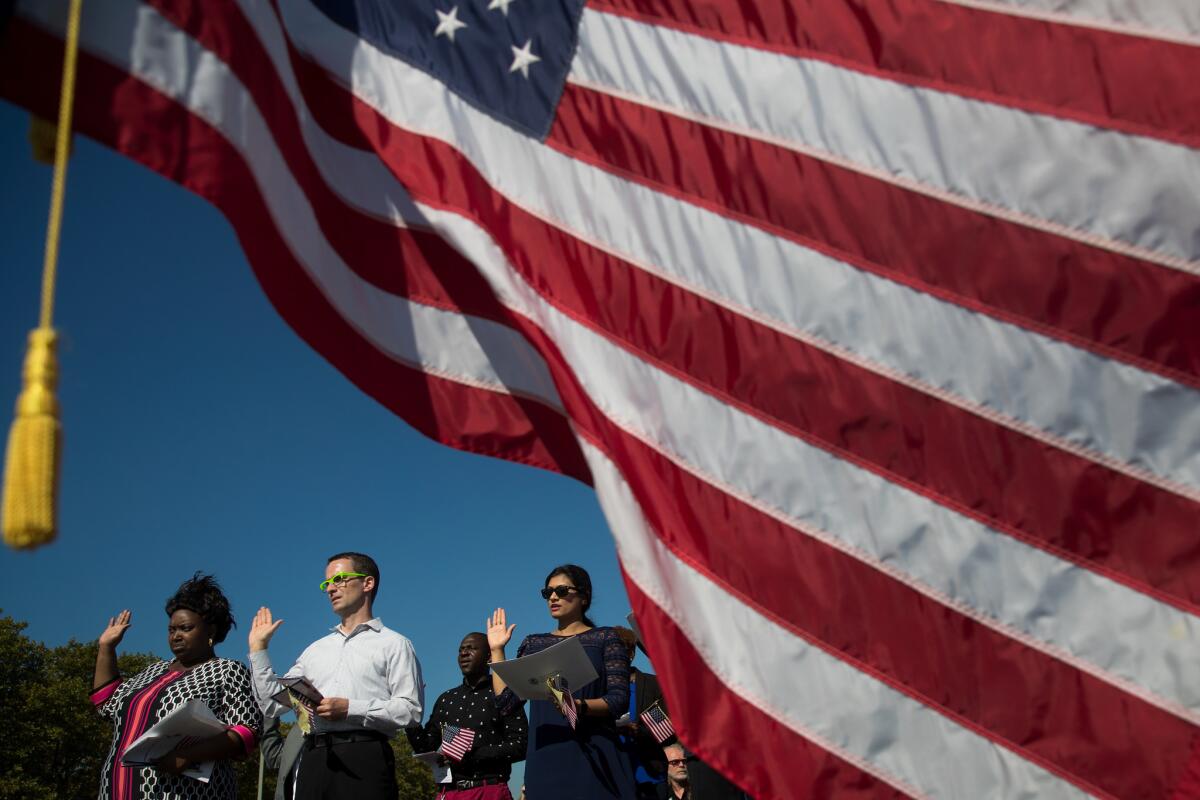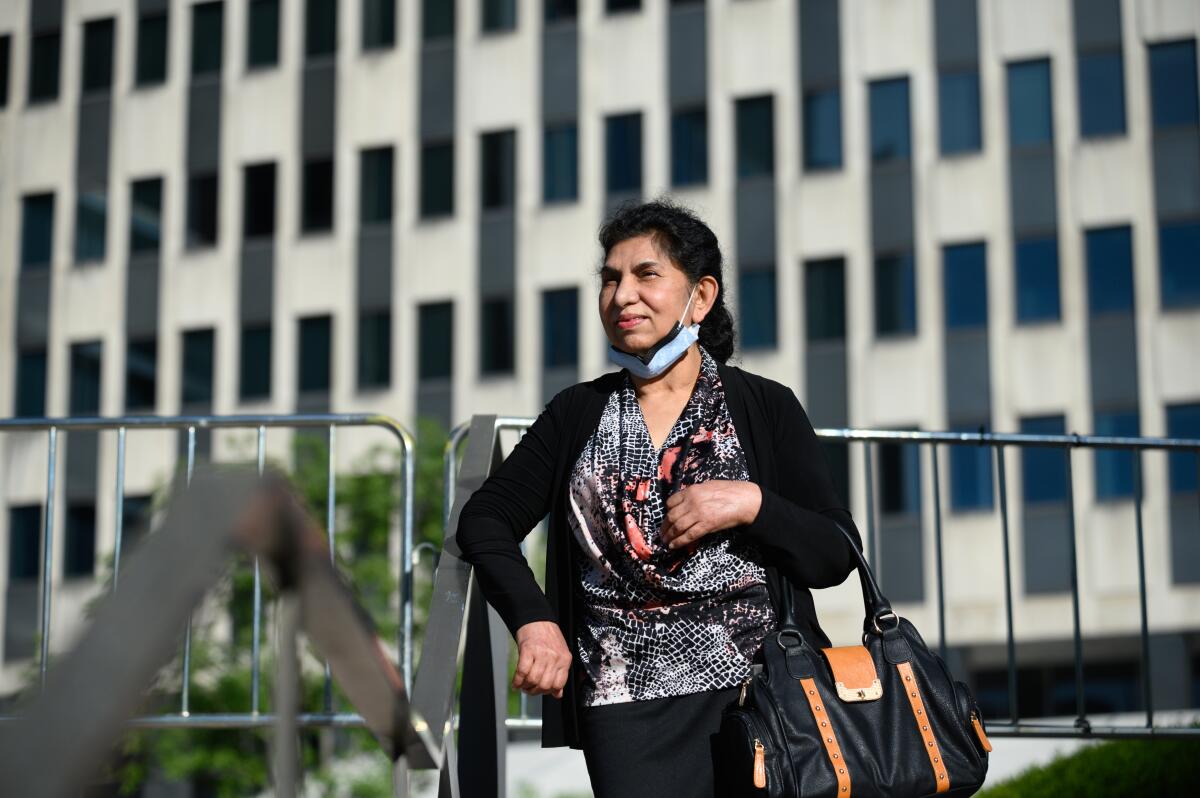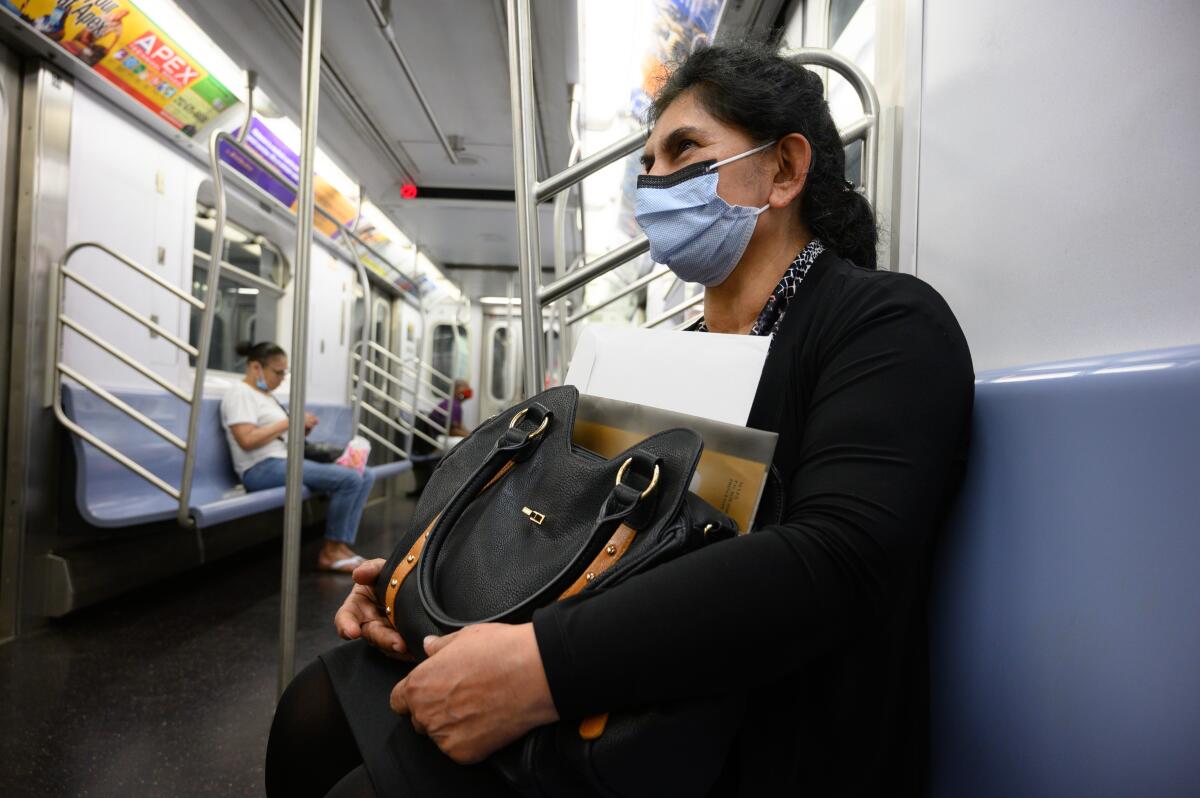Trump policy and coronavirus leave agency bankrupt, tens of thousands of potential voters in limbo

- Share via
WASHINGTON — Azra Nazir had a dress picked out, gray and blue. She had the subway directions. And in a rarity over two decades as an emergency room nurse, the 59-year-old had a few days off — her first in months of battling the coronavirus at its epicenter in Brooklyn.
After 20 years in the United States, where she secured asylum after leaving her native Pakistan, she would attend the ceremony at the end of March, raise her right hand, and become an American citizen at last.
“God made everything perfect for me,” Nazir said she thought.
Then, a few days before the scheduled day, she received a notice: Her oath ceremony had been canceled.
“Corona was at the peak, so I was just trying to think: ‘OK, God ... at least I am alive,’” she said. “That was the compensation at that time, because it was really very depressing in those days.”
Three months later, on Tuesday, when New York held its primary election, she couldn’t vote.
On Friday, she finally was able to take the oath.
“I’m relieved,” she said with a smile.
When her citizenship ceremony was postponed in March, Nazir became one of more than 110,000 green card holders whose applications for citizenship had been approved but who could not take the oath because U.S. Citizenship and Immigration Services, the federal agency that administers the legal immigration system, had canceled in-person ceremonies amid the coronavirus outbreak.
Since then, as states have started to ease restrictions, the agency has restarted ceremonies, keeping them short and small and cutting the backlog to fewer than 65,000, said USCIS spokesman Joe Sowers.
Now, rather than a jumbo screen and 10,000 would-be citizens packed into the Los Angeles Convention Center, some Angelenos are becoming Americans in drive-through ceremonies.
But with a backlog of more than 675,000 citizenship applications, the agency and the immigrants it serves now face another huge problem: A $1.2-billion budget shortfall threatens to force furloughs, or a total shutdown, just months shy of most states’ voter registration deadlines for the November election.
USCIS is a fee-based agency — by law, nearly all its funds come from the programs it administers. With the Trump administration having targeted legal immigration, not just illegal border crossings, and the coronavirus having further reduced fee-generating services, the agency is out of money.
A draft furlough letter from USCIS. The agency faces a $1.2 billion shortfall that the Trump administration says is due to coronavirus. Critics say the real reason is President Trump’s policy to restrict immigration.
The administration has threatened to furlough some 13,400 USCIS personnel — about 70% of its total employees — and began issuing furlough notices last week, warning it will effectively shut down the agency if it doesn’t get emergency funds from Congress.
“USCIS will not have sufficient funding to maintain operations through the end of the fiscal year,” Russell T. Vought, acting director of the Office of Management and Budget, wrote to Congress this month.
Outside critics and some current and former officials say that’s just how the White House wants it. The current crisis, they say, was not just inevitable, but intentional.
“I would not be surprised if a very large number of people end up not getting naturalized in time for the election,” said Doug Rand, co-founder of Boundless Immigration, a company that assists with immigration applications, and a former Obama administration official.

By one count, the Trump administration has changed USCIS policy 182 times in less than four years. Because the changes have curbed legal immigration — and therefore USCIS fees — they have led to more than $500 million in revenue lost annually, according to America’s Voice, an immigration advocacy group.
From President Trump’s first year in office through 2019, applications to USCIS by U.S. citizens seeking to bring immediate relatives to the U.S. fell by almost 30%.
The administration has also implemented new “wealth test” policies to keep out poor migrants, rejecting those who might use, or whose U.S. citizen children might use, public benefits.
On Monday, the White House moved to block many nonimmigrant employment-based visas through the end of the year.
And the latest restriction, issued Friday, effectively doubles the amount of time asylum seekers must wait for work authorization or denies it altogether in some cases, such as when they move to a new address.
Joseph Edlow, USCIS deputy director for policy, said in an agencywide memo Tuesday obtained by The Times that offices would start sending furlough notices within the week.
“Due to the economic impact of the coronavirus pandemic, we have needed to make some hard decisions,” Edlow said. “Rest assured, we continue to work with members of Congress, in conjunction with [Department of Homeland Security] leadership, in our efforts to secure the assistance needed to continue agency operations.”
The White House has not yet formally submitted a request to the House Appropriations Committee for the money, Evan Hollander, a committee spokesperson, said.
“Not even my dystopian mind envisioned this,” said one USCIS employee who received a furlough notice Friday, requesting anonymity to protect against retaliation.

Azra Nazir’s story illustrates the hurdles that many immigrants have to surmount to become U.S. citizens. In many ways, Trump has made it even harder.
She arrived in New York for a nursing training program in 2000.
She had worked as a nurse in Pakistan for decades and had survived years of violent abuse by a superior in the Pakistani military. She sought asylum in the U.S.
“I had in my mind of America that if you work … you can come live a good life, and you can live independent, you can live freely,” she said. “I live by myself; I have no fear for anybody.”
A colleague sent her asylum case to Ava Benach, an immigration attorney based in Washington,who argued that the gender-based discrimination and violence Nazir had faced qualified her for asylum. They won.
Benach doesn’t think they’d win if the case were considered now, with gender-based persecution “squarely in the crosshairs” of administration hard-liners such as Stephen Miller, Trump’s main White House advisor on immigration policy.
For years, she and Nazir fell out of touch — except for a dozen candy apples that Nazir, who is Muslim, would send Benach every Christmas. Then, in late 2019, Nazir reached out again.
“I applied for citizenship — three years ago,” she told Benach.
Nazir explained she’d applied just before the 2016 election and was interviewed roughly a year later — then heard nothing. By law, according to Benach, a decision is required in four months.
They sued USCIS.
“There was no legal basis to deny her citizenship,” Benach said.
“She is on the frontest of front lines,” Benach said of her longtime client. “When Trump says he wants to shut out immigrants, this is who he means.”

For the decade before Trump took office, USCIS had weathered the ups and downs in its application numbers with cash reserves, keeping the part of its budget covered by Congress at 5% at the most, according to a recent report by Doris Meissner, former commissioner of the Immigration and Naturalization Service, and Sarah Pierce, a policy analyst, both at the Migration Policy Institute, a nonpartisan research group.
In fiscal 2018, USCIS received more than 1 million fewer applications than the year before, leading to a $152-million drop in revenues from fees. Last year, the agency lost an additional $13 million.
Even before the coronavirus crisis, the administration was projecting a $1.2-billion shortfall for this year.
Last year, the agency adjudicated only a little over half of its applications. Processing time for a citizenship application has doubled under Trump compared with under President Obama.
The total backlog of all applications the agency receives has grown to 5.7 million cases at the end of March, the agency’s latest statistics show.
At the same time, the money the agency dedicated to rooting out fraud more than doubled under Trump, to $379 million, and for vetting, nearly tripled, to $149 million.
“It’s because of these new policies — they’ve not only bled the budget, but ... it’s like the agency is being set up to not do its own job anymore, and just be another arm of the fear machine,” said a USCIS official, speaking anonymously out of concern about retaliation.
Sowers, the USCIS spokesman, said the agency will clear the citizenship backlog from COVID-19 by the end of July.
But with the agency typically averaging 3,000 naturalizations a day before the pandemic, and now out of funds, the fate of tens of thousands of potential voters is far from guaranteed.
In a close election, these stalled citizens could be enough to swing a battleground state. But in some parts of the country, backlogs are so large that green card holders would have to have filed their applications two years ago in order to be able to vote in November, according to a report Boundless Immigration did in May.
Lawmakers from both parties — including the children of naturalized citizens — have called on the administration to “take all necessary measures,” including virtual ceremonies, to ensure naturalizations go forward.
Nazir counts herself lucky — she got in under the wire. But many more probably will not.
Being able to vote, she said, “I will be more free.”
Still, she wonders why it had to take so long. “Did I something wrong? You feel like you are being discriminated against.”
For a brief moment Friday in New York, the scene looked familiar: A USCIS officer asked Nazir — and 11 others, at a distance — to raise their right hands.
With no family here, she said, “I do not have anybody here to share my good news with.” But when she goes into the emergency room tomorrow, she said, she will bring cake and surprise her colleagues, who don’t know her citizenship status.
She’ll tell them: Her long wait is over. She’s an American now.
More to Read
Get the L.A. Times Politics newsletter
Deeply reported insights into legislation, politics and policy from Sacramento, Washington and beyond. In your inbox twice per week.
You may occasionally receive promotional content from the Los Angeles Times.











